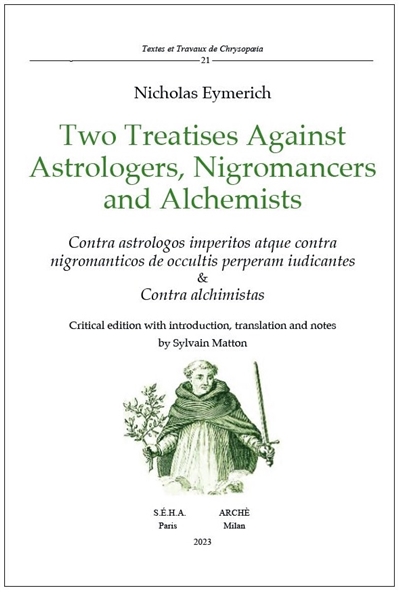en savoir plus

Carte fidélité
Permet à tous ses détenteurs d'obtenir 5% de réduction sur tous les livres lors du retrait en magasin (réduction non cumulable avec les réductions de type étudiant).
Offre également un certain nombre d'avantages auprès de nos partenaires.
Wishlist
Avec les favoris, retrouvez dans un espace les sélections effectuées au fur et à mesure de vos navigations dans le site.
Constituez pour votre usage personnel vos listes de livres en prévisions d'achats futurs et votre sélection d'articles, dossiers, événements, vidéos ou podcasts préférés ou à découvrir plus tard...
Il suffit simplement de cliquer sur "Ajout Favori" sur chaque page qui vous intéresse pour les retrouver ensuite dans votre espace personnel.
Requiert un compte Mollat
Mes Alertes
Requiert un compte Mollat
Two treatises against astrologers, nigromancers and alchemists. Contra astrologos imperitos atque contra nigromanticos de ocultis perperam iudicantes & contra alchimistas
Auteur : Nicolau Eymeric
en savoir plus
Résumé
Inquisiteur général pour la Couronne d'Aragon, le frère dominicain est relevé de sa charge et envoyé en exil par le roi Jean Ier, en avril 1393. Il trouve refuge à la cour pontificale installée à Avignon où il rédige deux traités dénonçant les astrologues, les nécromanciens et les alchimistes, qu'il accuse de frayer avec le diable. Il souhaite qu'ils soient poursuivis par l'Inquisition. ©Electre 2025
Lire la Quatrième de couverture
Réduire la Quatrième de couverture
Appointed Inquisitor General of the Crown of Aragon in 1357, famous for his huge Directorium Inquisitorum (1376), which was to become the procedural handbook for the Spanish Inquisition until the seventeenth century, the Dominican friar Nicholas Eymerich (ca. 1317-1399) stood out for his diligence, his severity and his inflexibility in the exercise of his office. But his eagerness and relentlessness to hunt down all those he deemed heretical, especially the Fraticelli, Beguards and Lullists, so angered King John I of Aragon that in April 1393 he was sentenced to exile. Yet this did not dampen his zeal, which he directed towards writing. Indeed, having found refuge at the papal court in Avignon, he wrote there in 1395 and 1396 Against Ignorant Astrologers and Against Nigromancers Who Wrongly Judge of Hidden Things and Against Alchemists, two treatises which are his ultima verba on the subject, and in which he endeavours to demonstrate that both astrology and divinatory arts as well as alchemy savour of heresy because they are grounded or fatally end in a covenant with the devil, and therefore fall under the inquisitorial jurisdiction.
Fiche Technique
Paru le : 24/10/2023
Thématique : Questions de société / témoignages
Auteur(s) : Auteur : Nicolau Eymeric
Collection(s) : Textes et travaux de Chrysopoeia
Contributeur(s) : Editeur scientifique (ou intellectuel) : Sylvain Matton - Traducteur : Sylvain Matton
Série(s) : Non précisé.
ISBN : 978-88-7252-408-4
EAN13 : 9788872524084
Reliure : Broché
Pages : 150
Hauteur: 24.0 cm / Largeur 17.0 cm
Épaisseur: 1.4 cm
Poids: 0 g
